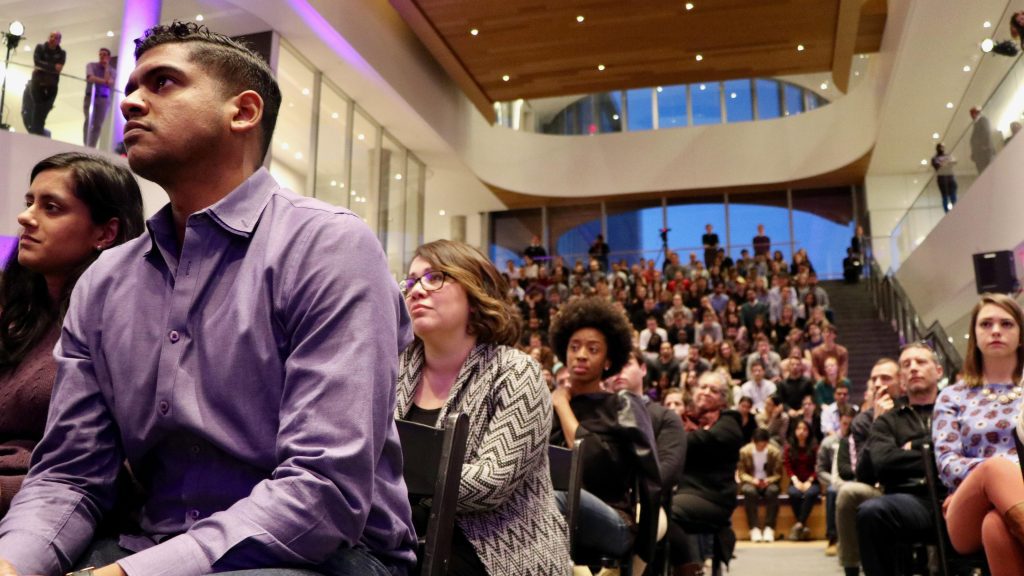Joe Biden Talks Industrialization, Income Inequality at Northwestern Kellogg

On March 9th, an eager audience gathered at Northwestern University’s Kellogg School of Management to hear what wisdom Joe Biden might have to impart from his distinguished political career to the world of business.
Speaking the day after observations of International Women’s Day around the world, the former vice president opened his talk with with a message about inclusion. He cautioned the crowd that “in order for a country to succeed… it has to husband all its assets. It cannot leave half its initiative, half its brain power, half of its courage, half of its capability, half of its strive behind.”
Although it was only a preface, the call for gender equality set the tone for the rest of the speech. The overarching theme, in Biden’s words, was inequity. And he didn’t just discuss the wage gap; he focused on what he called “geographic inequity,” or the rising inequality between various American cities and towns.
For much of his time at the podium, Biden decried the recent fate of industrial America, and of the middle class. He gave a bleak description of once-thriving Midwest towns and cities: “It’s called depression,” he said. “Empty factories, empty storefronts, empty homes, empty wallets. And the underpinnings of this geographic inequity are no mystery. It’s been in the making for years. States, and state laws, have undercut organized labor and the right to bargain, stunting the movement. The labor movement has been hollowed out and good, middle class jobs have been lost.”
Biden went on to discuss the disparity between cities on the coasts and those in the Midwest, saying that “a poor child in San Francisco has twice the chance of making a top income than one born in Detroit or Wilmington or Saginaw.”
He concluded that this is due to the fact that “they come from less segregated communities. There’s less income inequity, allowing them to see success around them. Their school systems are better funded. Social networks are stronger. More people are taking part in their communities.”
The talk was framed by current political issues, and the general solution that Biden gave spoke directly to the audience, comprised of MBA students and faculty. The major takeaway of the speech was that business leaders—those who will go on to shape the economy and, to some extent, policy—have a social responsibility.
He emphasized the importance of work, not just for economic stability, but as a source of identity. Biden recounted his father telling him, “Joey, you gotta remember a job’s about a lot more than a paycheck. It’s about your dignity, it’s about your respect, it’s about your place in your community. I mean this literally, not figuratively.”
As an example, he brought up causal links between unemployment and other social ills. For instance, he added that “every one percent increase in unemployment raises opiod deaths in a community by four percent.”
For Biden, the social obligation to push for fair wages and workers’ rights is not just about raising morale. Rather, it is central to the spirit of capitalism. The role that the business community must play in this scenario, according to Biden, is to push back against policies that limit workers’ rights.

Students at Northwestern Kellogg during the Biden speaking event. Photo via Evan Garcia / Chicago Tonight
Making sure that workers earn wages that match their productivity is a necessary part of a healthy economy. And, by extension, a healthy economy produces and furthers a healthy society.
Biden identified a few common business practices that he described as both anti-labor and anti-competition. He posed a rhetorical question to the audience: “The capitalist system, I thought—and I’m a capitalist—is all about being able to compete and bargain. So how do you justify non-poaching agreements to prevent one franchise from hiring away workers from another franchise?”
He added, “How do you justify taking hourly wage-earners, not managers at all, and re-classifying them, denying them in 1.2 billion dollars in wages, to go to shareholders. Where’s that bargaining deal? Where’s that capitalist competition?”
While Biden’s expertise and experience do not lie in business, he did highlight the importance of responsible business practices in a stable and equitable society. And perhaps, ultimately, that is the most valuable insight that he can provide to MBA students—a unique vision about business that tries to examine its role in the rest of the social world, along with profit and productivity.
